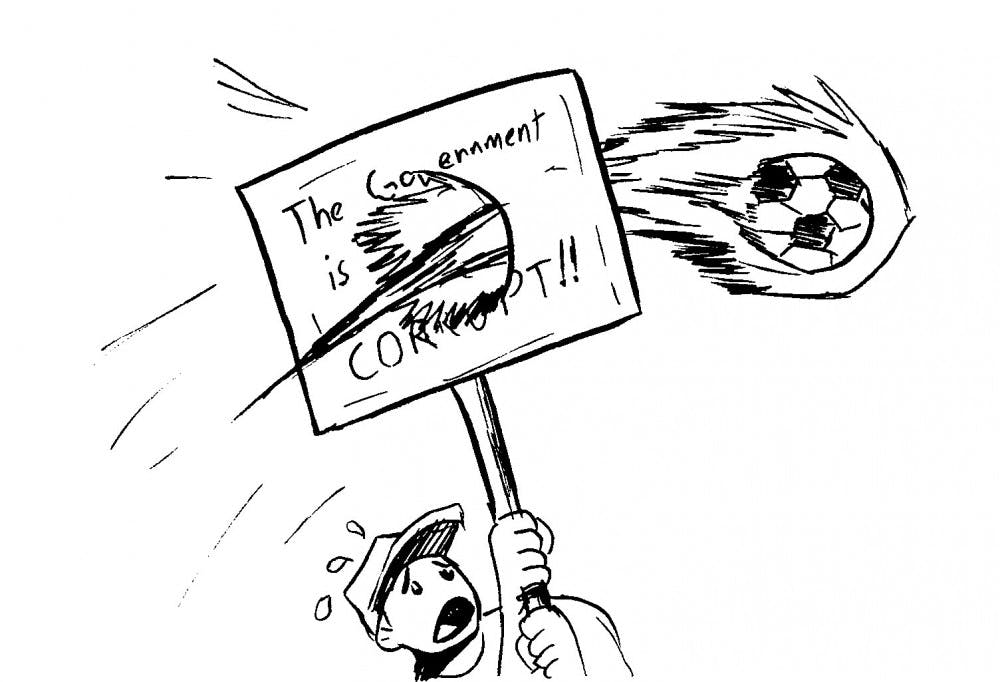Soccer seems to be gaining popularity in the United States for the first time during the FIFA World Cup. The USA-Portugal game was the most watched soccer game in United States history, averaging 18.2 million viewers.
Whether this phenomenon is due to the aging of the generation of people who actually play soccer, social media or the fact that we’re doing well (something any red-blooded American can appreciate), it’s hard to ignore the World Cup this year, despite its location in far away Brazil.
The red, white and blue will still advance to the knockout stage despite a 0-1 loss to Germany.
However, the stage that the world really needs to be focused on is the location of the World Cup itself — Brazil.
It’s no secret that there has been civil unrest resulting from the absurd amounts of money Brazil has reallocated from the community’s coffers to accommodate the expense of hosting an international sporting event across 12 cities.
Protests roared across Brazil last year in response to issues with spending, public transportation, political corruption and an infrastructure ill-equipped to handle the incoming crowds of foreign spectators.
But that’s all old news. Since the Cup has begun, the protesters and demonstrators have calmed to huddle round the TV and cheer their heavily-favored national team on.
Back here in the U.S., the growing excitement over the Cup has also shunted Brazil’s civil issues to the side. What are a few political issues when put up against “The Beautiful Game,” after all?
Once FIFA has packed up and moved out after July 12, Brazil will be left with a $15 to $20 billion tab. There will be massive soccer stadiums in cities that don’t even have soccer teams. At one of the locations, Manaus, it cost $300 million to build a stadium and three workers died during its construction. All for just four of the World Cup’s 64 matches.
After the Cup, other soccer matches can be played there, sure. But according to an article from The Guardian a few weeks ago, matches in Manaus bring in 1,000 people at most; contrast that with the stadium’s 42,000-person seating occupancy.
Amidst the suggestions of bribery, corruption and scandal, the 2022 World Cup will be set in Qatar, a wealthy yet developing country in the Persian Gulf. This year’s Cup isn’t even finished and hundreds of workers have already died building Qatar’s stadiums.
FIFA needs to take a step back and consider the financial, social and environmental implications the World Cup brings, and whether or not a bidding country can bear it.
Fun fact: the 1994 World Cup was held in the United States. One of the stadiums was in Pontiac, Michigan — less than an hour’s drive from East Lansing. It’s likely that just a handful of students know that a world-renowned, international sporting event took place just down the street from MSU’s campus.
Pontiac is hardly a ghost town. The Silverdome, where the Cup took place (another fun fact: MSU developed and installed the grass for the indoor field) lived on until the Detroit Lions moved to Ford Field in 2001.
The point is, there are countries that can handle the implications of hosting a multinational sporting event, and there are those that can’t. Perhaps with different government officials or different policies set in place to offset the expenses, Brazil could have been one of those countries that handled it well. Latin American nations love their soccer, arguably more than anywhere else in the world, so it made sense to host a World Cup there.
But as great as nationalism is, as great as patriotism is, it is far more important to recognize that people are suffering for our entertainment.
As Americans watch the Cup this year, cheer on our team. Chant “I Believe,” and support our athletes until the very end. Once we reach that end, however, don’t forget that the end of the Cup won’t be the end of the issues it has caused in Brazil.







